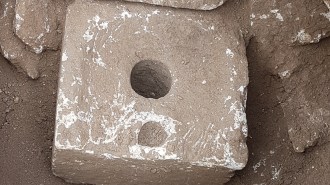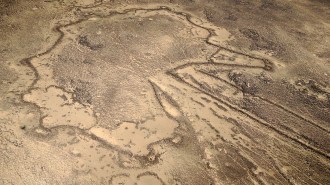Humans
Sign up for our newsletter
We summarize the week's scientific breakthroughs every Thursday.
-
 Humans
HumansOldest traces of a dysentery-causing parasite were found in ancient toilets
Scientists have found traces of giardia in two toilets used by wealthy residents of Jerusalem in the 7th and 6th century B.C.
By Freda Kreier -
 Chemistry
Chemistry19th century painters may have primed their canvases with beer-brewing leftovers
Several paintings from the Danish Golden Age contain remnants of brewer’s yeast, barley and other grains commonly used to brew beer.
-
 Neuroscience
NeuroscienceA brain implant helped a man with paralysis walk more naturally
A successful test of a system that restores communication between the brain and spine could ultimately help many people with paralysis.
By Simon Makin -
 Tech
TechDeblina Sarkar is building microscopic machines to enter our brains
The ultratiny devices can communicate wirelessly from inside living cells and may one day help cure brain diseases.
By Nikk Ogasa -
 Humans
HumansRace car drivers tend to blink at the same places in each lap
Blinking is thought to occur randomly, but a new study tracking blinks in racing drivers shows it can be predictable — and strategic.
-
 Health & Medicine
Health & MedicineHow over-the-counter birth control pills could improve reproductive health
The switch to over-the-counter access for a birth control pill will circumvent certain barriers and help improve reproductive autonomy.
-
 Health & Medicine
Health & MedicineAs U.S. courts weigh in on mifepristone, here’s the abortion pill’s safety record
Decades of data, including data collected during the coronavirus pandemic, support mifepristone’s safety. The drug’s fate in the United States may now be determined by judicial review.
By Meghan Rosen -
 Archaeology
ArchaeologyThe oldest scaled-down drawings of actual structures go back 9,000 years
Rock engravings in Jordan and Saudi Arabia may be maps or blueprints of desert kites, massive structures once used to capture animal herds.
By Bruce Bower -
 Science & Society
Science & SocietyAnténor Firmin challenged anthropology’s racist roots 150 years ago
In The Equality of the Human Races, Haitian scholar Anténor Firmin showed that science did not support division among the races.
By Sujata Gupta -
 Health & Medicine
Health & MedicineStimulating spleens with ultrasound hints at a treatment for inflammation
Using an intense kind of ultrasound stimulation against inflammation holds promise but so far has been tested only in rodents and human blood samples.
-
 Health & Medicine
Health & MedicineScientists may have found an antidote for death cap mushrooms
A dye countered the effects of a mushroom toxin in human cells and mice. If the antidote does the same in people, it has potential to save lives.
-
 Science & Society
Science & SocietyDeliberate ignorance is useful in certain circumstances, researchers say
The former East German secret police, the Stasi, spied on people for years. But when given access to the Stasi files, most people didn’t want to read them, researchers found.
By Sujata Gupta